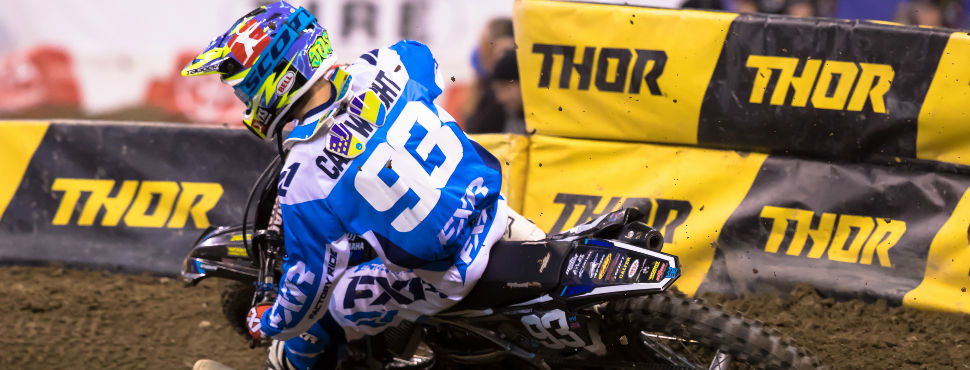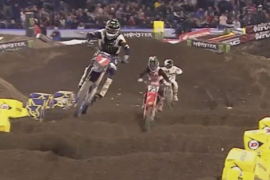Photos by: Chase Yocom
These “Privateer Showcase” interviews presented by Race Tech Suspension at MotoXAddicts tell the stories of the guys in the trenches week in and week out trying to chase their dream of racing professional Supercross. While the riders at the front of the pack get the money, the T.V. time and the glory that goes with it, there’s a huge pack of guys just hoping to get a spot inside a factory semi. We tell their stories.

This week’s “Privateer Showcase” interview is with EBR Performance / TXS Productions / MX Culture / Sandbox Kings Graphics / Yamaha rider Josh Cartwright. Josh is in his third year as a professional Supercross rider in the Eastern Regional 250SX Supercross Championship, but for the moment he has something equally as important occupying his time: graduating from Florida State University with a degree in Information Technologies. While most riders at the national #93’s level are solely focused on the goal of getting to the next level of Monster Energy Supercross, Josh has taken the road less traveled and is also focused on life after racing while still spending ample time improving his Supercross skills at The GOAT Farm [Ricky Carmichael’s training facility in Tallahassee, Florida].
Over the first three years of Josh’s professional Supercross career, he has progressed from one main event in 2015 to three main events in 2016 to already making four main events—the last four in a row—in 2017. It has been a steady progression, and after his career best 13th last weekend in Detroit, we thought we would give Josh a call and get to know the student athlete’s story a little better. Josh’s path to the top level of the sport is the road less taken but it is a road that more parents in this sport need to know is an option.
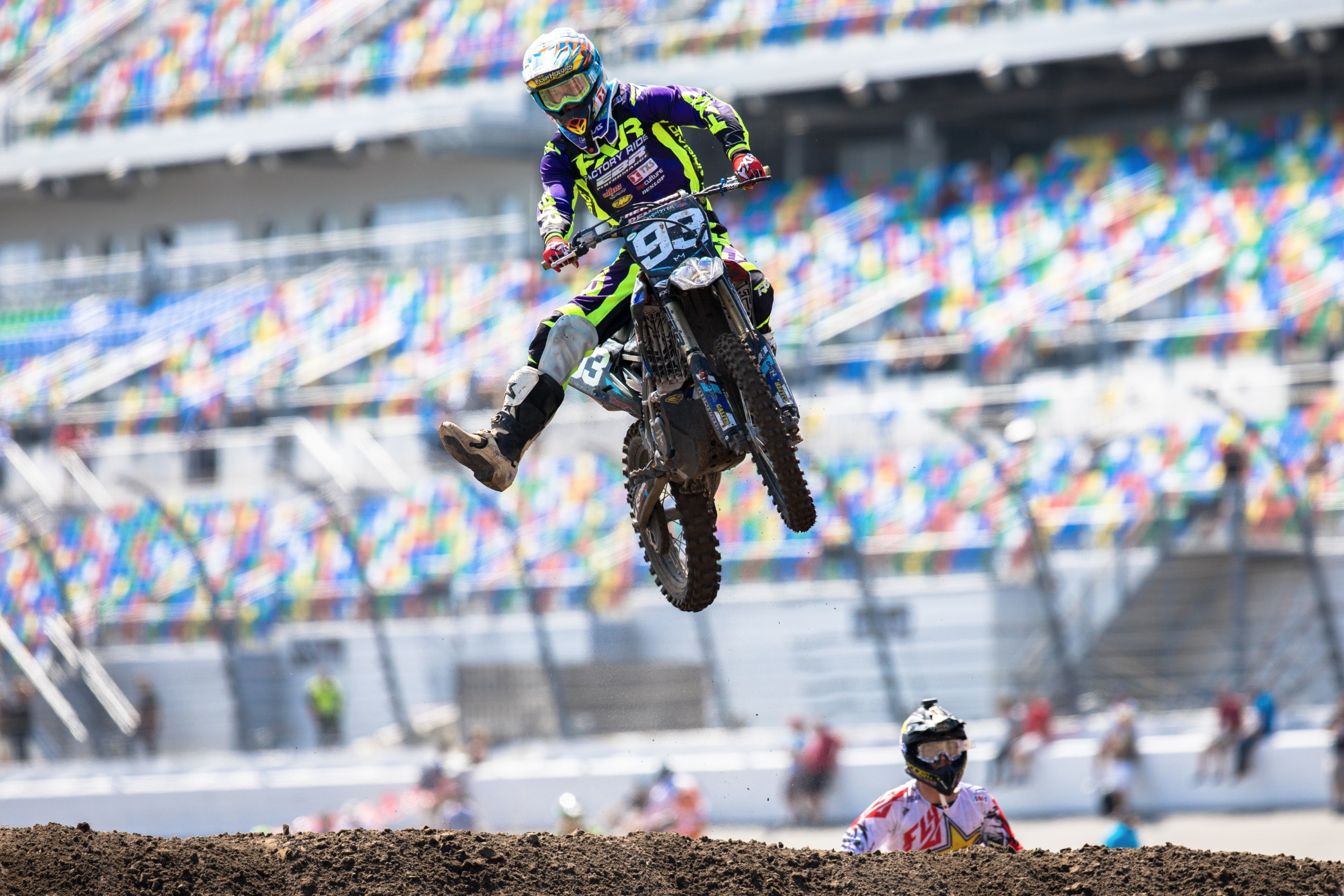
You had to wait until you got home from school in order to do this interview. For the people that don’t know, where are you going to school at?
I go to school at Florida State University.
What brought you to FSU? I know you’re originally from Tennessee.
Yeah, I’m originally from Memphis, but my dad knows the assistant basketball coach here so we kind of have a tie in there, but when I came to GPF [Georgia Practice Facility] in 2012 for the summer to train for Loretta’s, we noticed that FSU is literally 30 miles away. We started thinking, if we’re going to keep doing motocross and I want to go to college, let’s see what we can do here. For my senior year of high school, I moved here so I could get in-state tuition and also so I can train at the same time. It was perfect.
A lot of motocross racers could notice FSU and want to go there, but it’s not the easiest school to just get accepted to. You obviously focused hard on your academics while you were in high school as well.
Yeah, FSU definitely is a difficult school to get in to, but it also helped to be in state for a year. Out of state is really, really hard. All through high school, I focused on my schooling, and motocross was just… It was also a love of mine; I gave it a lot of time, but school was number one always. I had to get A’s and B’s for my mom to say, “Okay, you can keep doing motocross,” so I’d be able to get into a good college.
That was the same deal I had when I was racing, but obviously things have changed with home schooling and motocross being the number one focus ahead of school for a lot the top amateurs. What year of college are you in, what’s the major and what are your future plans to use that degree?
I’m a junior. I’m majoring in IT—information technology. Both my parents, my mom’s an IT manager at FedEx and my Dad’s an IT contractor for AT&T, so I have a lot of connections at FedEx and AT&T to get a job as an IT worker at one of those or anywhere pretty much. Also, I’d love to work IT at Yamaha or any of the major brands and also race at the same time—go to California, work for them and, on the weekends, race Supercross.
With you having two full-time commitments between Monster Energy Supercross and college, what’s your weekly schedule like at the moment? You’re at a high level with both, so what’s that like?
During the week—that depends on the semester—I make my classes either in the morning or afternoon, but sometimes both. I’ll go to class in the morning and then head straight to the Carmichael Farm where I train. I’ll train, leave there, go home and take a shower and head back to class for the afternoon. Then I’ll do my other studies at night, and on Friday, I’ll fly out to Supercross’ and fly back on Sunday. A lot of privateers drive to the races, but since I’m in school, I have no time to drive. I have class on Friday, so I have to leave right after class. Luckily, I have a lot of sponsors like TXS Productions and Sandbox Kings Graphics that help me out with some revenue to get some money in there. EBR Performance has helped out too and made a good year for me, for sure, even as a privateer. A lot of privateers talk about how hard it is—and it is really tough to be a privateer—but I look at it like, I’m doing the sport I love in front of 60,000 people in a football stadium. You can’t do better than that. It’s just a dream come true.
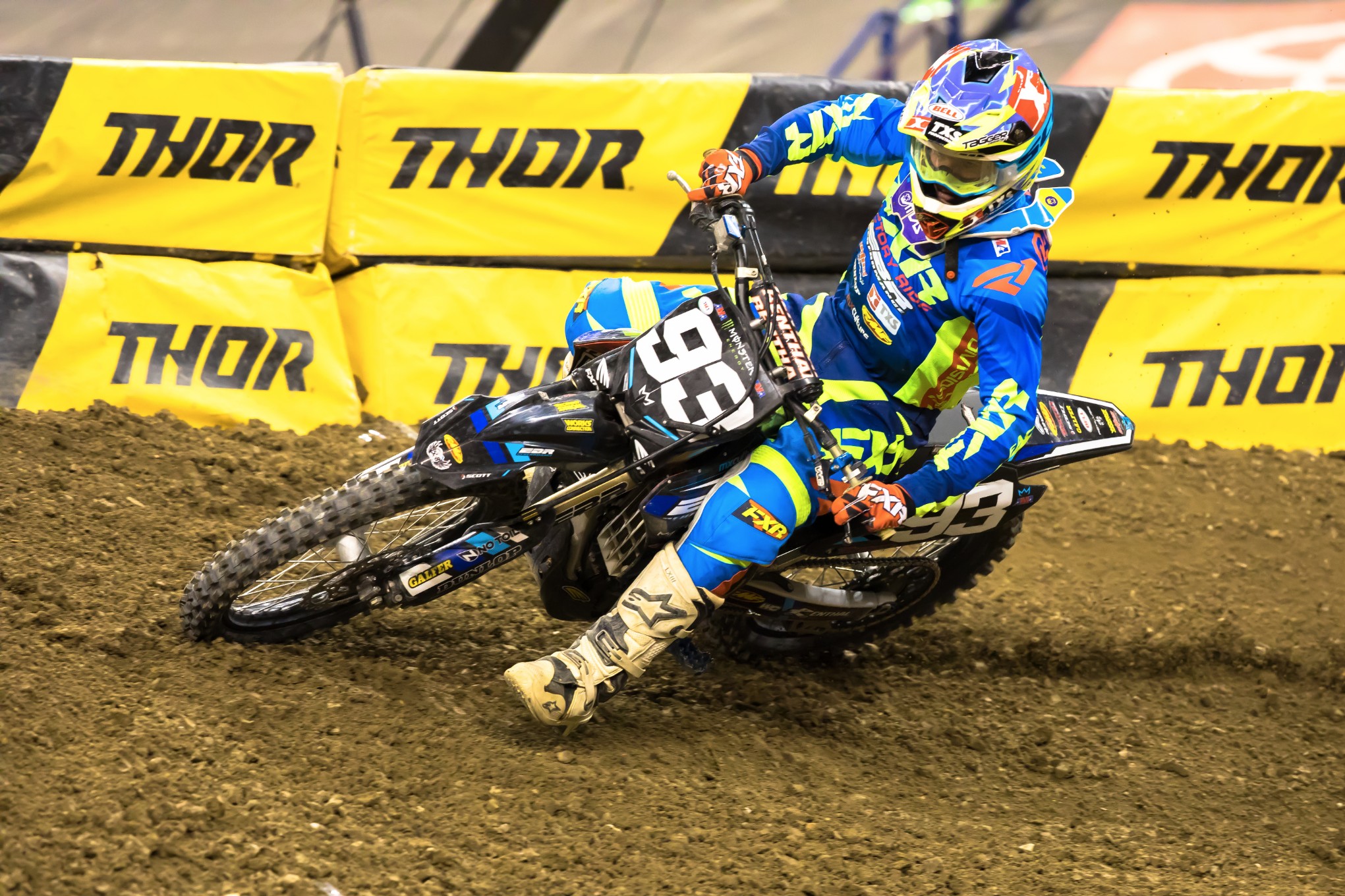
So the words “social life” are non-existent. (laughs)
There is a little bit. I have some friends from the high school here, from FSU and some of the guys at the farm—Gavin Faith, Jace Owen and Gannon Audette. We have some poker nights and hang out. I try to have a social life as much as possible ’cause you got to kind of get away from the stress of studying and motocross. You got to get away and relax.
Originally being from Tennessee, what was your local spot growing up?
I lived in Memphis, so I had a track we went to a lot called Hidden Valley. I tried to ride every weekend, but when I was in high school, I also did track and field, cross country and swimming. My weekend’s were pretty filled up with doing meets for those sports, so I was on a pretty busy schedule even in high school.
How serious was moto for you with all that going on? I first noticed you in the Loretta Lynn’s results in 2013. You did well in the Two Stroke class, and if I remember right, you were top five in the College Boy class that year.
Yeah, I won the College Boy class that year. I started, like everyone, around three or four years old. I always rode on the weekends but was never at a training facility. I always had good results when I was at the older side of my classes. So 12-13 class, I had good results when I was 13. On 50’s I podiumed at Lake Whitney, but once I got to 125’s, I started getting better and better. I top-fived in Schoolboy 1 in one moto at Loretta’s, and then in ’13, I finally won a class at Loretta’s in College Boy. At that point, my dad said, “You’ve been doing this, and you finally won with just being a kid that rides on the weekends. Let’s see what you can do with some training, but you’re staying in school and not doing home school.”
You went a route less traveled to the top of the sport, but you’re young and the way you’re progressing at SX, this could turn into something for you. You made one main in your rookie year in ’15. You made three main events in ’16, and now in 2017, you’re turning into a regular main event guy. To what do you attribute that steady progression to?
Just hard work. I think a lot of people try to get to that next level too quickly. I’m more realistic and I know it’s really hard to get to that goal, but I’m slowly getting there. Last year, I made three main events, and this year, I’ve made the last four in a row. The Carmichael Farm helps me unbelievably. Since I’ve gotten there, I’ve seen my level skyrocket. Ricky [Carmichael], Jeannie [Carmichael], Big Rick [Carmichael, Sr.] and my trainer, Rob Beams [Coach Robb], are always helping. Now I need to get to the top ten to get that good ride—maybe a Cycletrader or a Traders Racing ride—and then there’s that next level stepping stone to a Star Yamaha or Pro Circuit ride.
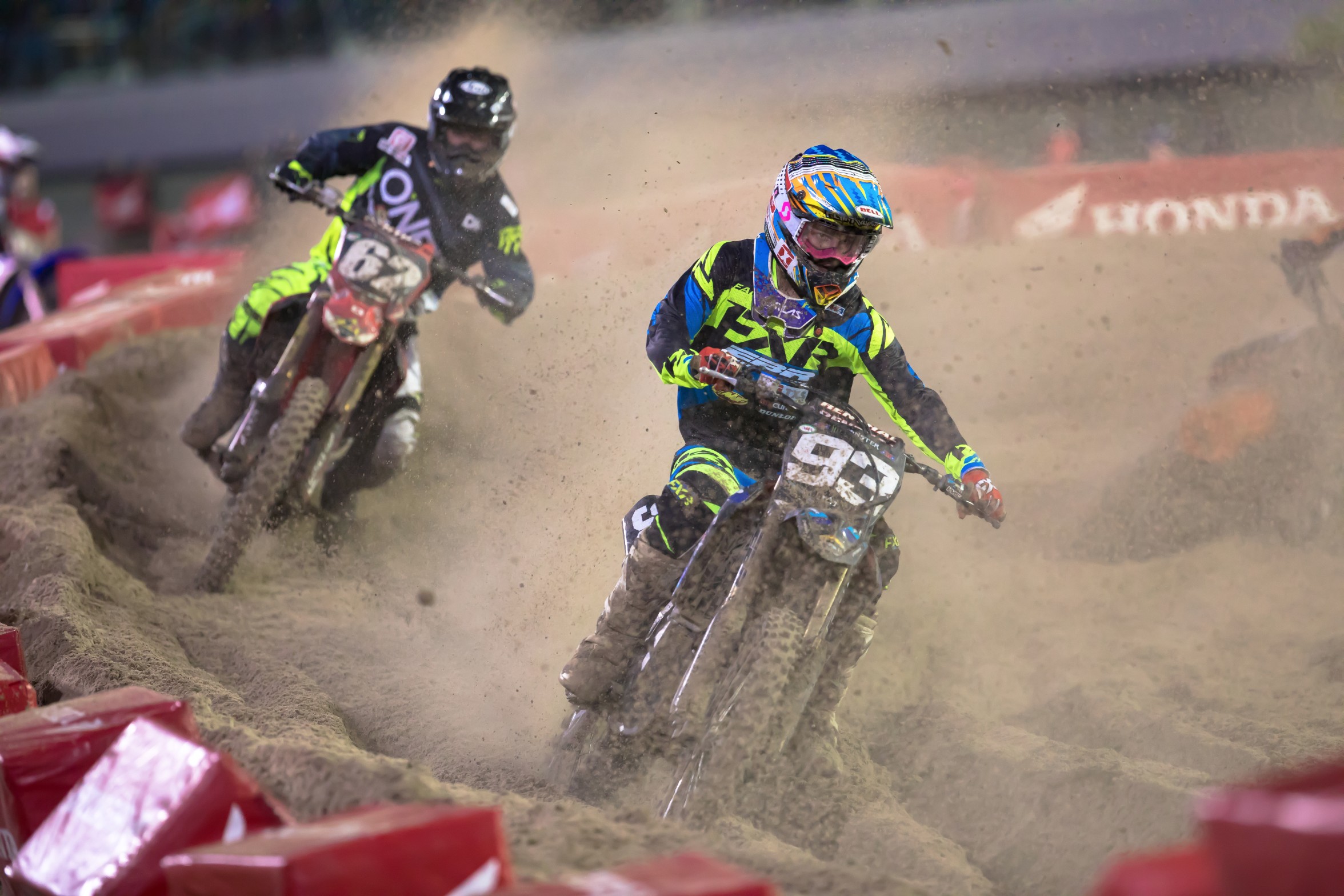
You were close to the top ten last weekend in Detroit with a career best 13th. You barely avoided that first turn pileup that got Zach Osborne and others. You got caught up a little bit in it, but you skated it for the most part. Talk about Detroit.
When that happened, I had flashbacks to Indianapolis. In Indianapolis, I jumped into a big pileup in the second section, and it put me down a lap on the first lap. When that happened this weekend, I was like, “Oh, not again.” I finally just squeeeezed out of that pileup and was able to get into that group around the top ten. I was in tenth for about half the race and then fell back three positions. Getting 13th was just unbelievable, seeing that slow progress again. Now 13th and maybe a top ten by the end of this year. It was just an unbelievable experience.
What did you think of the Detroit track? Is the slick, hard-packed, gravelly soil something you normally like?
The track was actually not too bad. The only part of the dirt that was bad was after the finish line on the straightaway. It was really slick there. The dirt was decent and tacky in practice. It got a little slick in the race but not too bad. The track wasn’t really a separator—everyone was doing the same jumps and rhythms. It was who could do the corners faster. We have a hard-packed track at the farm and a soft pack track at the farm, so we have both to practice on.
We normally ask in these interviews what’s the toughest part about being a privateer, but you seem to be making the best of it. Sounds like you know this is part of the game and you are doing everything you can to get to that next level.
Everyone has to go through this. Some people go straight from a factory amateur team to a factory pro team, but not everyone can do that. You have to make the best out of it, not complain and try to get sponsors. You have to sell yourself to sponsors and say, “Hey, this year I can do this. Is there any way you can help out with motors, suspension, bikes, flights, entry fees or anything.” Anything will help, and the more you sell yourself and progress with the racing, the next step’s going to come even easier. Hopefully, that next step is a bigger team and then a factory team.
Sounds like you have the right perspective on it all. Thanks for doing this interview. Who are the sponsors you would like to thank for getting you to the races in 2017?
Yeah, I’d like to thank EBR Performance, Altus Motorsports, TXS Productions, FXR Racing, Sandboxkings, MX Culture, Atlas Brace, Renthal, FMF, Triggr Racing, Scott Goggles, Rekluse, Ankle-Savers, MotoE, Works Connection, Tagger Designs, Dunlop, Alpinestars, Nihilo Concepts, No Toil, Galfer, Cycraand the Carmichael Farm.

